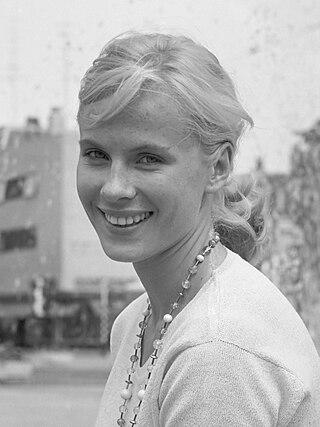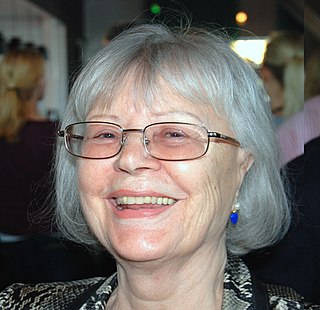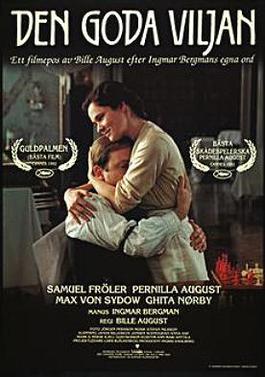Related Research Articles

Ernst Ingmar Bergman was a Swedish filmmaker. Widely considered one of the greatest and most influential filmmakers of all time, his films are known as "profoundly personal meditations into the myriad struggles facing the psyche and the soul."

Liv Johanne Ullmann is a Norwegian actress and film director. Recognised as one of the greatest European actresses of all time, Ullmann is known as the muse and frequent partner of filmmaker Ingmar Bergman. She acted in many of his films, including Persona (1966), Cries and Whispers (1972), Scenes from a Marriage (1973), The Passion of Anna (1969), and Autumn Sonata (1978).
Talia Rose Shire is an American actress who played roles as Connie Corleone in The Godfather films and Adrian Balboa in the Rocky series. For her work in The Godfather Part II and Rocky, Shire was nominated for Academy Awards for Best Supporting Actress and Best Actress, respectively, and for the Golden Globe Award for Best Actress in a Drama for her role in Rocky.

Amarcord is a 1973 comedy-drama film directed by Federico Fellini, a semi-autobiographical tale about Titta, an adolescent boy growing up among an eccentric cast of characters in the village of Borgo San Giuliano in 1930s Fascist Italy. The film's title is a univerbation of the Romagnol phrase a m'arcôrd. The title then became a neologism of the Italian language, with the meaning of "nostalgic revocation". The central role of Titta is based on Fellini's childhood friend from Rimini, Luigi Titta Benzi. Benzi became a lawyer and remained in close contact with Fellini throughout his life.

Persona is a 1966 Swedish psychological drama film, written and directed by Ingmar Bergman and starring Bibi Andersson and Liv Ullmann. The story revolves around a young nurse named Alma (Andersson) and her patient, well-known stage actress Elisabet Vogler (Ullmann), who has suddenly stopped speaking. They move to a cottage, where Alma cares for Elisabet, confides in her, and begins having trouble distinguishing herself from her patient.

Scenes from a Marriage is a 1973 Swedish television miniseries written and directed by Ingmar Bergman. Over the course of six hour-long episodes, it explores the disintegration of the marriage between Marianne, a divorce lawyer, and Johan, a psychology professor. The series spans a period of 10 years. Bergman's teleplay draws on his own experiences, including his relationship with Ullmann. It was shot on a small budget in Stockholm and Fårö in 1972.

Erland Josephson was a Swedish actor and author. He was best known by international audiences for his work in films directed by Ingmar Bergman, Andrei Tarkovsky and Theodoros Angelopoulos.

David Harald Vilgot Sjöman was a Swedish writer and film director. His films deal with controversial issues of social class, morality, and sexual taboos, combining the emotionally tortured characters of Ingmar Bergman with the avant garde style of the French New Wave. He is best known as the director of the films 491 (1964), I Am Curious (Yellow) (1967), and I Am Curious (Blue) (1968), which stretched the boundaries of acceptability of what could then be shown on film, deliberately treating their subjects in a provocative and explicit manner.

Berit Elisabet Andersson, known professionally as Bibi Andersson, was a Swedish actress who was best known for her frequent collaborations with filmmaker Ingmar Bergman.

Harriet Andersson is a Swedish actress, best known outside Sweden for being part of director Ingmar Bergman's stock company. She often plays impulsive, working class characters.

The Best Intentions is a 1991 Swedish television drama film directed by Bille August and written by Ingmar Bergman. It is semi-autobiographical, telling the story of the complex relationship between Bergman's parents, Erik Bergman and Karin Åkerblom, who are renamed Henrik and Anna in the film but retain their true surnames. The film documents the courtship and the difficult early years of their marriage, until the point when Anna becomes pregnant with their second son, who corresponds to Ingmar himself. Samuel Fröler and Pernilla August played Henrik and Anna, respectively.
The 38th New York Film Critics Circle Awards, announced on 3 January 1973, honored the best filmmaking of 1972.
The 44th New York Film Critics Circle Awards honored the best filmmaking of 1978. The winners were announced on 20 December 1978 and the awards were given on 28 January 1979.
The 36th New York Film Critics Circle Awards, honored the best filmmaking of 1970.
The 49th New York Film Critics Circle Awards honored the best filmmaking of 1983. The winners were announced on 21 December 1983 and the awards were given on 29 January 1984.

Richard Hobert is a Swedish scriptwriter and film director.
The 46th National Board of Review Awards were announced on December 25, 1974.
European art cinema is a branch of cinema that was popular in the latter half of the 20th century. It is based on a rejection of the tenets and techniques of classical Hollywood cinema.
The 9th National Society of Film Critics Awards, given on 5 January 1975, honored the best filmmaking of 1974.
References
- ↑ Weiler, A. H. (31 December 1974). "Film Critics Cite 'Amarcord' and Fellini". The New York Times. Retrieved 29 December 2017.
- ↑ "Film Stars Win". The Evening News. 31 December 1974. Retrieved 29 December 2017– via Google News Archive.